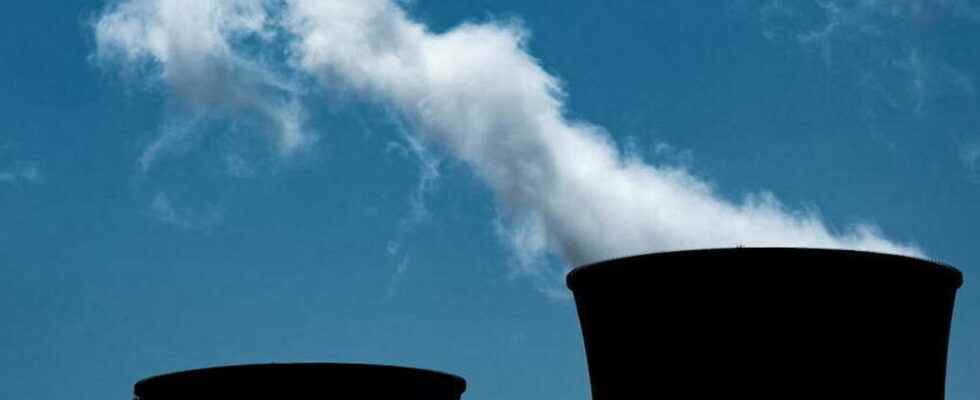Relaunch of the sector, energy sovereignty, climate… Since the Covid-19 crisis, French students are once again interested in civil nuclear power.
By Louis Chahuneau
© NICOLAS LIPONNE / Hans Lucas via AFP
Published on
Lhe engineering schools are rubbing their hands. In recent months, nuclear engineering training has been attracting more and more students. “Ten years ago, we mainly associated nuclear power with Chernobyl, Fukushima and radioactive waste. In the meantime, there has been Covid-19 and the accelerated awareness of climate change, ”explains Stéphane Sarrade, research director at the Atomic Energy Commission (CEA).
At the University of Paris-Saclay, which offers the Nuclear Energy master’s in English, there is renewed attractiveness for the sector: “Until now, it was the dismantling course that had a large number of staff, but this year , there has been a rebalancing”, analyzes Gaël Sattonnay, professor and coordinator of the master. The operation course, meanwhile, reopened this year, when it had been closed for two years, for lack of students. The trend is similar to the National Institute of Nuclear Sciences and Techniques (INSTN), where the head of educational development, Xavier Perette, advances a 70% increase in enrollment between 2018 and 2022 on the nuclear engineering diploma, a year of specialization (bac + 6) open to 80 engineering students per year. “We select from more candidates, so the levels are also higher,” he explains to the Point.
“The Jancovici Effect”
Currently in a year of specialization at the INSTN, Lucas Puigserver, 22, wants to move towards the control of nuclear reactors. Between job prospects, the debate on France’s energy sovereignty, revived by the war in Ukraine, and the decarbonization of energy production, there is no lack of motivation for these students. It is this last aspect that convinced Lucas Puigserver: “In high school, we were told that nuclear power was not necessarily good for the environment. As I researched, I realized that there was a lot of misinformation and that nuclear energy was in line with my values”, he explains during an electronic interview.
READ ALSOEnergy: when textbooks misinformThis is what Stéphane Sarrade calls “the Jancovici effect”, named after the very media-savvy polytechnician Jean-Marc Jancovici, who scours TV sets to defend his pro-nuclear vision of the energy transition. “He is very popular with engineers because he speaks to us about technique”, confirms Lucas Puigserver. They are not the only ones: according to an Ifop study carried out last September, 75% of French people are in favor of the production of nuclear energy in France, a growing trend in recent years.
With 71% of its electricity produced by the 56 pressurized water reactors (PWR) on its territory, France is one of the champions of the sector in the world. This architecture allows it to produce low-carbon electricity: 6 gCO2eq/kWh against 10 for wind power, 443 for gas power plants or 1,060 for coal power plants, according to figures from Ademe.
To achieve its objective of carbon neutrality in 2050, France must both reduce its energy consumption and double the share of electricity in the final energy consumed from 25 to 55%, according to the government’s roadmap. If a few voices still plead for a scenario based 100% on renewables, Emmanuel Macron closed the door there by announcing on February 10 the construction of six new EPR 2 reactors by 2050, plus eight as a bonus. “It’s the return of pragmatism”, summarizes Stéphane Sarrade of the CEA.
READ ALSOHow Emmanuel Macron intends to relaunch French nuclear power
Loss of technical skill
According to the Group of French nuclear energy industrialists (Gifen), the third French industrial sector (220,000 employees) will recruit between 10,000 and 15,000 people per year until 2030. But, behind these major announcements, some experts fear the weight of this recovery. Does France still have its know-how from the 1980s, the golden age of the nuclear industry? The case of the Flamanville EPR, whose commissioning is already more than ten years late, notably due to design flaws, is the most flagrant symbol of this. Questioned by the Senate last May on the subject, Bernard Doroszczuk, director of the Nuclear Safety Authority (ASN), confirmed that, “over the past ten years, the entire nuclear sector has lacked projects in sufficient volume to be able to maintain skills and recruit staff.
A concern that Xavier Perrette also admits to the INSTN: “There is indeed a loss of technical skills in the construction trades, especially since the industry has suffered a large wave of retirements. In addition to the 4,000 engineers to be recruited over the next few years, it will also be necessary to find qualified welders or industrial electricians, all professions whose training is long. Faced with this observation, professionals in the sector created the University of Nuclear Professions in 2021. For its part, the government has devoted 470 million euros from its France Relance plan to help the nuclear sector to recruit. Hoping that the younger generation will respond.
